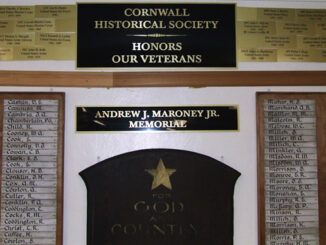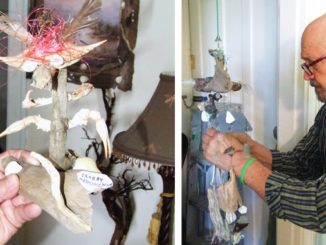
Cornwall Landing was once a bustling community
Writing books is hard work, but Bob McCue has a good explanation for why he does it. “I love Cornwall and I love its history,” he told me. His latest work is called “Cornwall Landing.”
The landing is a narrow strip of real estate that borders the Hudson River. It was once a thriving community with hotels, a factory, and private homes.
Today, a portion of the landing has become Donahue Memorial Park. Why did the author choose to write about this area? I didn’t ask, but it’s not hard to determine. The dedication refers to boyhood outings with his father. The two would wander onto the railroad coal pier, catch fish in the Hudson, and watch trains go rumbling past the riverfront.
The community, once known as the “Gateway to Cornwall,” was long gone by then. The author tells us that by the early 1960s, there were only seven families living in the area. So when the postmaster (Elizabeth Otto) retired, her final assignment was dismantling the post office.
In the previous century, visitors to Cornwall usually arrived by boat. It took the Mary Powell three hours to make the trip from New York City. And Cornwall residents claimed they could set their clocks by the ship’s arrival. The captain was obsessed with punctuality. It was joked that he would swat the flies off the ship’s railings if he thought the extra weight would cause him to fall behind schedule.
Eventually, trains supplanted the riverboats as the primary means of transportation. Mr. McCue shares a story about a locomotive that roared through Cornwall at a high rate of speed. Observers assumed that the engineer was either drunk or dead.
Unfortunately, the second assumption was correct.
While looking out the window to check on the remainder of the train, the engineer struck his head and was killed. Investigators found his cap near the tracks in Fort Montgomery. His crew stopped the engine to avoid a head-on collision with another train.
Mr. McCue sometimes wanders geographically. But the diversions are entertaining. For example, he tells us about Nathaniel P. Willis, a famous author who settled up the hill in what is now Idlewild. His wife hired a runaway slave, Harriet Jacobs, as a nanny for her children. And when the nanny’s former owner came north to claim her, Mrs. Willis saved the day by paying $300 for the nanny’s freedom. Some years later, Harriet Jacobs produced an autobiography describing her years in slavery.
The anecdotes in “Cornwall Landing” are accompanied by an abundance of photographs from many sources. The author has drawn on resources from the Cornwall Public Library, the Cornwall Historical Society, and several friends.
The book can be ordered from Amazon.



